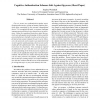22 search results - page 2 / 5 » Quantifying the security of preference-based authentication |
SP
2006
IEEE
13 years 11 months ago
2006
IEEE
Can we secure user authentication against eavesdropping adversaries, relying on human cognitive functions alone, unassisted by any external computational device? To accomplish thi...
PERCOM
2010
ACM
13 years 3 months ago
2010
ACM
—This paper presents a Secure Code Update (SCU) system for Wireless Sensor Networks (WSNs). This solution achieves different security goals. First, through a dedicated authentica...
NDSS
1999
IEEE
13 years 9 months ago
1999
IEEE
Kerberos is a distributed authentication system that many organizations use to handle domain-wide password security. Although it has been known for quite some time that Kerberos i...
BROADNETS
2005
IEEE
13 years 11 months ago
2005
IEEE
- In this paper, we study and quantify the impact of the most widely used security protocols, such as 802.1x, EAP, IPSEC, SSL and RADIUS, in wireless local area networks (WLANs). B...
ASIACRYPT
2000
Springer
13 years 9 months ago
2000
Springer
Rather than use a shared key directly to cryptographically process (e.g. encrypt or authenticate) data one can use it as a master key to derive subkeys, and use the subkeys for the...

